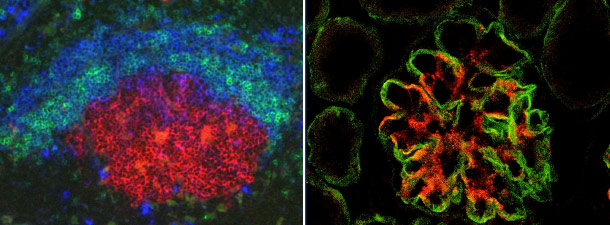TRR 130
B cells: Immunity and Autoimmunity
B cells are an important part of the human immune system. When pathogens invade the body, B cells are activated and differentiate to so-called plasma cells which produce antibodies fighting the invaders. Scientists of the Transregional Collaborative Research Centre (CRC) “B cells: Immunity and Autoimmunity“ (TRR130) examine how B cells are activated, how they differentiate, and how plasma cells manage to produce high-affinity antibodies for long periods of time. For this purpose, scientists of the University of Erlangen-Nürnberg (with the speaker Prof. Dr. Lars Nitschke), Charité Berlin, Rheuma-Forschungszentrum Berlin, University of Freiburg, University of Göttingen and of the University of Ulm are funded for the second period (since July 1, 2017) by the DFG. Their objective is to elucidate in detail how B cell responses are triggered, how self-reactive B cells are eliminated, and how B cells learn to memorize pathogens with which they have been challenged before (the so-called immunological memory). A further aim is to understand the regulation of B cell-mediated antibody responses by both cellular signals, as well as by soluble regulatory proteins.

A second scientific topic of this Transregional CRC is to examine and understand dysregulated functions of B cells that can lead to attacks of antibodies on the own body. Dysregulated anti-self reactive antibodies or autoantibodies can be the involved in the pathogenesis of autoimmune diseases such as rheumatoid arthritis, systemic lupus erythematosus, or multiple sclerosis. There is also evidence that it is not only the autoantibodies, but also other antibody-independent B cell functions that contribute to these autoimmune diseases. The scientists of this consortium aim to broaden the general knowledge of autoimmune diseases with B cell involvement and to develop new therapeutic strategies against these diseases.
